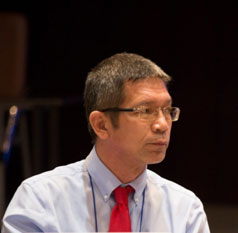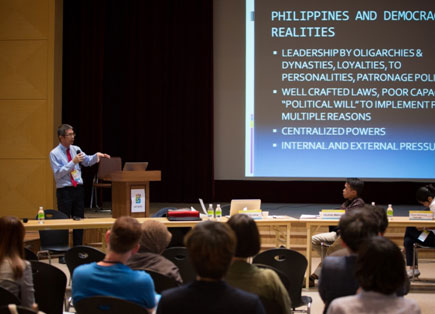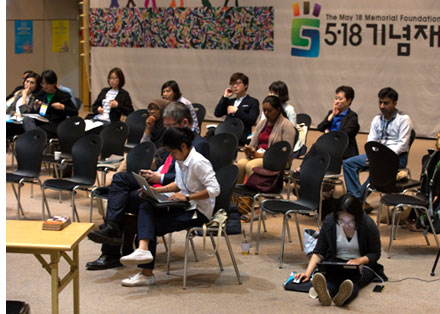Last May 16-18, 2016, The May 18 Memorial Foundation hosted a successful annual event, the Gwangju Asia Forum under the theme of “State Violence and Historical Distortion.” Here are some of the valuable voices from the participants.
Reflections on Gwangju and May 18
Raul Antonio A. Torralba
Administrative Officer, Initiatives for International Dialogue (IID), Philippines

Raul Antonio A. Torralba
In the first Gwangju Forum I attended in 2014, the topic we tackled was on elections and how states and parties in power sought to manipulate these to their benefit. It was both interesting and enlightening to see how different governments, political partiesandother parties in power in various parts of Asia, while claiming to be founded on, and organized around human rights and democratic principles, were often unwilling to give up power nor respect popular will when their own powers and entitlements were challenged. It was also disheartening to hear that oftentimes, what the highest levels of governments and officialdom were willing to do, the lowest government units were oftentimes willing to follow, making such practices widespread, entrenched and sadly acceptable by default. Exposing and countering such corrupted governance and bureaucratic practices formed a key call for the forum participants to pursue at the time.
At the second Gwangju Forum I attended last year, I made my presentation on the state of the ongoing peace process in my own region of Mindanao, Philippines, where a secessionist war had been ongoing for close to fifty (50) years. The toll of such a war and the shortcuts taken by the state to gain its objective of victory covered everything from indiscriminate military bombardments, forced evacuations, hamlets, arbitrary arrests, torture and even outright executions. Other presenters discussed specific laws and state acts that limited the freedoms of their citizens, particularly those critical of the state. Such examples of state actions across Asia again underscored the willingness of state agencies and forces to stretch and even violate their mandate, for the sake of ensuring state interests and objectives are maintained. The need to remain vigilant in documenting, exposing, confronting and undertaking concerted action against such violations was a shared call for all.
In this year’s forum, the discussions were on regressive trends in democracy in Asia. In this latest discussion I attended, the presenters showed how human rights and democratic principles often come up against state interests that are not that developed, accommodating nor explicit on how they interpret human rights and democracy. Underscoring this dilemma was the inability and even unwillingness of many Asian states to interpret rights and democratic principles into local context and application. Thus, while a number of these Asian nations expressed support for the global principles and rights as expressed in various United Nations (UN) charters, these same states proved unable to interpret and apply such ideals to their own country’s situation and context. As a result and in actual practice, many of these governments basically wound up saying that they “DO”respect and subscribe to specific rights and democratic principles, yet they also tend to add a big “BUT”towards the end, as a qualifier and condition to how those rights and principles can be specifically applied.
As a result of such presentations and discussions fostered through the May 18 Foundation’sGwangju Asia Forum, participant groups and organizations like IID get to see that their realities and experiences are not at all limited to their shores but are spread across other nation-states as well. Cross-pollination of ideas and approaches are fostered at these events, along with alliance and network building, crucial building blocks to establishing common platforms for solidarity and advocacy work. These become the direct return that participants can immediately take back with them and incorporate into their efforts. Such an opportunity remains tremendously valuable and deserves continuing support.
But there are also less obvious aspects and lessons that I have personally learned and valued with my participation in the efforts of May 18 Foundation. Personally, even though I’ve looked at the images, artifacts and remnantson display during my visits to Gwangju’s museums, memorial parks, archives and records a number of times already, I am prone to viewing them all through a veil of my own memories and musings. Where I see pictures of police hammering batons down on hapless demonstrators, where I see guns being aimed and fired, bleeding bodies sprawled, loved ones mourned and graves being filled, I also see in my mind’s eye Filipino faces and voices superimposed on such images, like grayed-out and grainy pictures of newspapers and magazines of the Philippine’s own past. When I hear tearful recollections by loved ones of those who’ve suffered and died, translations are sometimes not required, for pain and grief remain common, no matter if spoken in another language. The value of such a shared recollection allows for a shared bonding and solidarity process to take place, unifying us through that shared common experience. This is something I’ve only experienced in Gwangju thus far.
Personally, I also find thedemocracy struggle ofGwangju and the Philippinesseemingly written in the same ink. Thehistory of both struggles bear periods of repression, autocracy, martial rule, foreign interference, assassinations, bloodshed and ultimately resistance and triumph. Gwangju’s uprisingstarted in protest of martial law being declared. It cost, depending on information sources, anywhere fromhundreds to even thousands of lives lost. By comparison, the 4-day EDSA Revolt of 1986in the Philippines happened nearly five years after martial law had already been repealed, albeit autocratic rule still remained. EDSAwas hailed worldwide as a near bloodless revolt and expression of people power by the Filipinos. Yet on more thorough reflection, the Marcos dictatorship is now cited for more than 75,000 human rights abuse cases for more than 14 years of sanctioned murders, disappearances, rape, torture and illegal detention. In both instances, the poignant and crucial involvement of common civilians in such uprisings served as the tipping point against which modern tyrants wavered and fell.
Yet like many popular movements, it remains crucial to continue revisiting and assessing such popular victories and building on them, to ensure that governments and their systems do not backslide into their previously repressive states, nor get co-opted for less ideal ends. Again, we must learn to let history teach us, just asthe efforts of May 18 Foundation has allowed local as well assolidarity and advocacy groups and organizations in other countries to share from May 18’s past, while learning lessons from eachother as well.
While at times uncomfortable to face, such stark reminders of the past tug at the emotions and underscore the truth that repression and injustice are not exclusive to any one state, and need to be exposed and accounted for both by the victimized and the perpetrators. Through the May 18 Foundation’sannual commemoration, itsPrize for Human Rightsand the Gwangju Asia Forum that I’ve attended, not only those well-versed in such events but the general public as well,are allowed to revisit and thresh out lessons from the past and present. More importantly, all are given the opportunity to plot out measures and steps to ensure that such violations to rights and liberties are confronted, challenged and condemned, wherever they may take place. From such steps, global movements, actions and ideals are shaped and put forward. This is one valued contribution that the May 18 Foundation’sown Gwangju Asia Forum adds to the global discourse on rights and democracy, an opportunity for all rights and democracy supporters and defenders to jointly assess and address common issues and propose shared plans.
In comparison of more recent events, I also feel that the perspectives on the Gwangju Uprising and our own EDSA Revolt are both beingtempered and challengedby time. Reality and context for both have been broadened, and even the narrativeadjusted, whether by default or intent. Leaders and governmentshave changed in the years since those historical benchmark events. But for both countries, and even many other states in the region, we have also learned that the power structures and relationships have at times basically remained unchanged, or even been further entrenched. Scions of the once-powerful families that the people overthrew decades ago now ironically and unapologetically aspire for,or even sit in the highest offices of the land. For suchcountries, the narratives of history now come under attack and are continuouslychallenged. Some accounts of history may have actually been changedand even silenced, in apparent attemptstoshift the historical narrative from their polarizing truths decades ago, into something less controversial and more publicly acceptable. This reality underscores the saying that history is oftentimes written by the victors.
In recognition of this, small advocacy groups and organizations like IID see the value and need to continuously engage on the path that the May 18 Foundation and its Gwangju Asia Forum have taken. Continuing our sharedbattle to keep the rights and democratization narrative accurate now also challenges us all to pursue this battle on a different arena, aimed at a younger generation far removed from the conflicts and conditions that spurred our generations to action. By revisiting these events constantly and making the next generations aware of the sacrifices and costs of victory, movements such as those of May 18 help its people to reconnect to the unvarnished truth that they all owe their rights and liberties to.
So thirty years sinceour own celebrated EDSA revolution and capped by another commemoration of May 18,I’ve again visited the graves of the fallen, smelled the scent of incense and flowers about and listened to “March for the Beloved” numerous times.I’ve noted the damp cigarette pack offered at one grave and the guttering candle at another. I’ve heard a monk bang his drum while doing his rounds and prayers among the graves. I’ve seen young boys and girls dressed all in black bow before each grave before cleaning them of debris and weeds. On another plot I note an old couple doing the same thing. I’ve again looked at faces streaked by tears on giant screens and listened to the tremulous recounting of events by various family members and witnesses. My hairs have again stood on end as I watched the plays and heard the mournful yet defiant tone carried in the songs of the performers onstage. These are some of the personal images I bring away with meafter each visit, images both new yet common to many parts of Asia, just as the struggles and legacy of May 18 are uniquely Gwangju’s, yet intrinsically part of the price many are willing to pay in our common struggle for democracy, human rights and dignity.




